Rosalind Wiseman's Blog, page 5
May 26, 2021
Webinar – Anxiety: Help! I’m Freaking Out! with Megan Saxelby
We all experience anxiety. The goal is to learn how to slow down rather than freak out, even when it’s messy and hard. We all need strategies to understand our anxiety and how it impacts us.
In this anxiety webinar we will…Walk through a Tiny Guide on AnxietyGain strategies to help young people manage their anxietyGet tools and resources to better manage hard moments and challenging feelingsSlide Deck
Resources mentioned
RSA Short: Empathy by Brené Brown
Emotional Agility by Susan David
Permission to Feel by Marc Brackett PhD
Owning Up Curriculum: Empowering young people to create cultures of dignity, understand emotions, and build essential social skills.
Recent Posts Webinar – Anxiety: Help! I’m Freaking Out! with Megan Saxelby Acknowledging the Pain and Celebrating the Small Moments of Joy Catching Up to Cancel Culture
Get the Cultures of Dignity Newsletter
Email:* jQuery(document).bind('gform_post_render', function(event, formId, currentPage){if(formId == 7) {} } );jQuery(document).bind('gform_post_conditional_logic', function(event, formId, fields, isInit){} ); jQuery(document).ready(function(){jQuery(document).trigger('gform_post_render', [7, 1]) } );
The post Webinar – Anxiety: Help! I’m Freaking Out! with Megan Saxelby appeared first on Cultures of Dignity.
May 20, 2021
Acknowledging the Pain and Celebrating the Small Moments of Joy
As always we asked our teen editorial advisors to review this Communiquette. This time we included some of their direct quotes.
Acknowledging the Pain and Celebrating the Small Moments of Joy
Is it possible to feel so many feelings simultaneously? Happiness, languish, connection, anger, fear, and anxiety. While many of us in the United States are feeling the joy of increased freedom, people are still hurting. A few weeks ago we asked young people to share their feelings and state of mental health. What they shared was painful to read but so important. Not only for us to have a better understanding of their perspective but also to give young people an outlet to share their experiences and know they will be listened to.
Here are their words.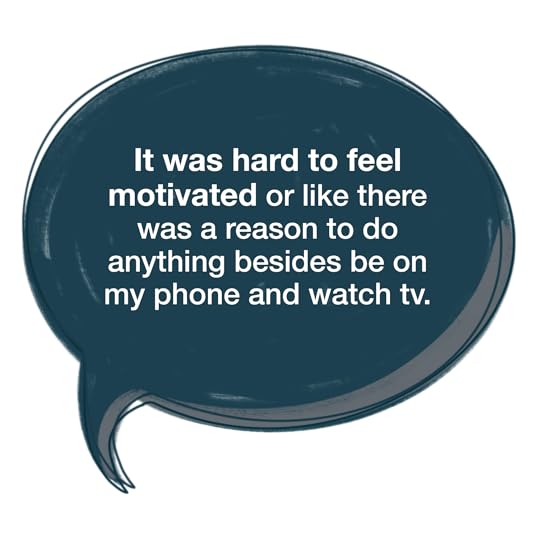
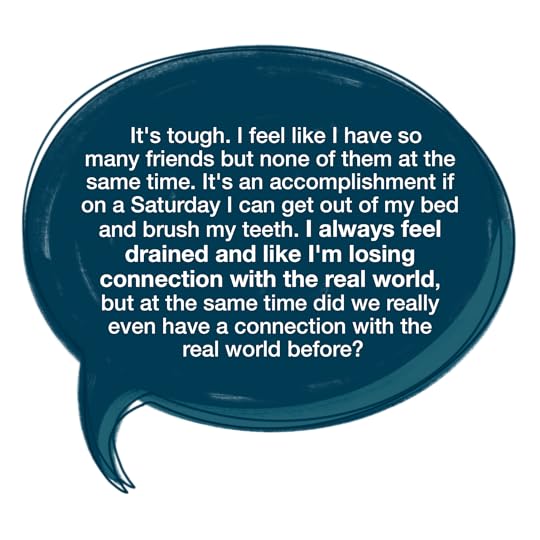
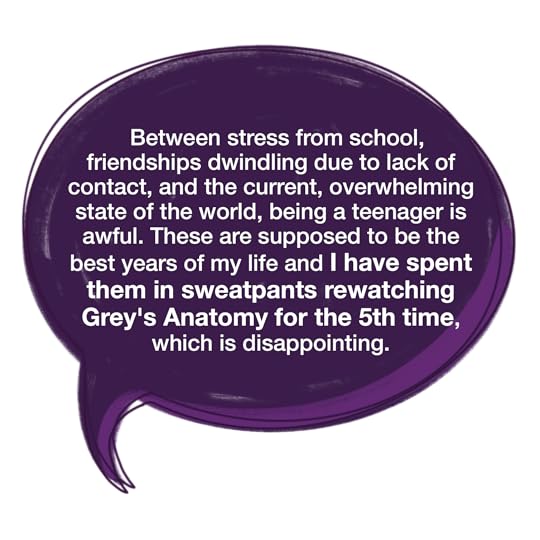
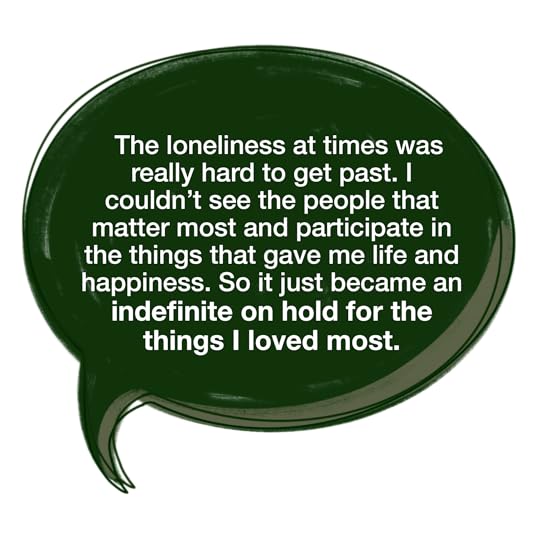
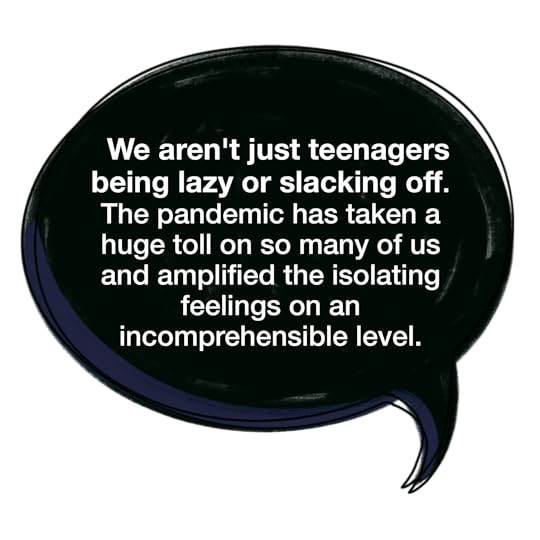
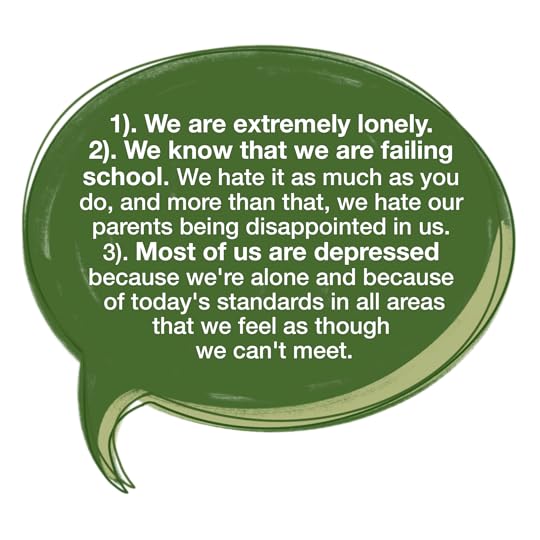
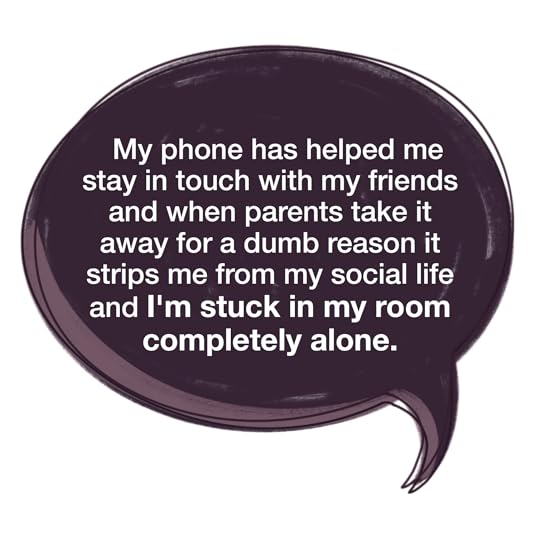
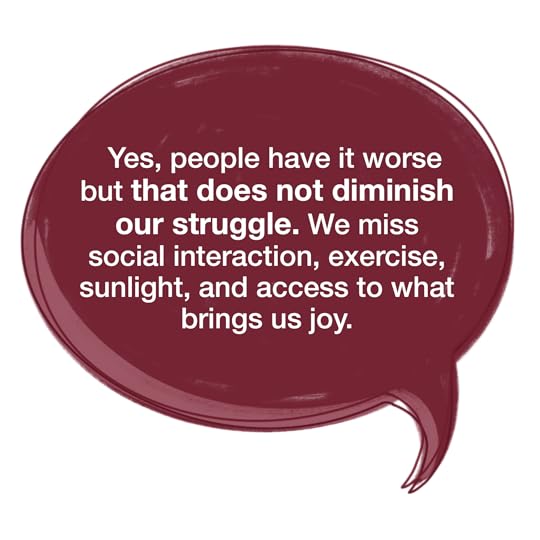
At the same time, even while young people are struggling they are still managing to reclaim moments of joy. In-person rites of passage are returning. Proms and graduations with family by your side are happening–at least in some parts of the world.
We want to share with you some of what that looks like so we asked our Youth Editorial Advisors to share pictures of celebrating new found normalcy in their lives. The small moments that we used to take for granted, that now seem so much more special.

This is my sisters and I hanging out in Annapolis. – Lela

This is a version of Thror’s map from The Hobbit that I made, with a sword pictured as well. I love Lord of the Rings and The Hobbit, so making this was a fun and positive way to destress after my exams. – Liza

To me this photo represents my most recent moment of happiness. The combination of a cool dusk breeze, serene sunset, and laughter shared with companions eases away the stress and apprehension of my life. – Knox

I went to prom two weeks ago! – Helen

This is me and my best friend at brunch for Easter. This felt really special to me because last Easter I was not able to celebrate how we usually do so for us to be able to go to brunch with our friends and celebrate was really exciting! – Lydia

This is me and my friends after not seeing each other for MONTHS. We quarantined beforehand. I’m the one in white. – Pacifica

We just finished the final exam and it felt GREAT finally being free from those stressful moments. Not only were we done with huge tests, but we got to spend some amazing moments with friends which is something we haven’t done in a while. – Abigail

This is me with my dog Jerry. We recently got him and he has been a fun and positive change in my family over the past few weeks. – Gus
It’s a lot. If you’re feeling happy–you get to have that feeling. You get to have all your feelings. Good or bad, feelings are always true in the moment but they can always change. Feel the good moments and let those feelings give you more strength to sit with moments of sadness, anxiety, frustration, and fear.
As we support young people here’s what they tell us they need:Ask them if they want support by just listening to them or want to discuss solutions. Tell them that even though you were their age once, you don’t know what it’s like to be growing up today. Remind them that negative emotions are real and they can change. Take a pause when they’re feeling a moment of joy.
We think that’s good advice for all of us.
Recent Posts Acknowledging the Pain and Celebrating the Small Moments of Joy Catching Up to Cancel Culture Parenting Forward Podcast: Cultures of Dignity with Carey Goldstein
This originally appeared in our newsletter Communiquette.
Join our newsletter, Communiquette!
Email:* jQuery(document).bind('gform_post_render', function(event, formId, currentPage){if(formId == 7) {} } );jQuery(document).bind('gform_post_conditional_logic', function(event, formId, fields, isInit){} ); jQuery(document).ready(function(){jQuery(document).trigger('gform_post_render', [7, 1]) } );
The post Acknowledging the Pain and Celebrating the Small Moments of Joy appeared first on Cultures of Dignity.
May 13, 2021
Catching Up to Cancel Culture
About the Author: Sara Davis is a high school senior from Colorado and on the Cultures Advisory Board. This article was written with the contribution of the Cultures of Dignity Editorial Advisory Board.
Catching Up to Cancel CultureBy Sara Davis
Cancel culture arrived in my life when I was fifteen. It was 2017 and I was in 9th grade. I remember debating what it meant in my environmental club meeting.. We agreed that it involved pulling financial support from the person being canceled; we disagreed on when and where it was okay to post something on social media against that person. Our conversations about who to cancel were about artists. As in, should we keep listening to R. Kelly, or seeing Harvey Weinstein movies, or buy a copy of Ender’s Game ? We agreed that after the #MeToo movement, a good line to draw was not to financially support someone who sexually assaulted another person, or abused their power to hurt another person. But we didn’t know where it stopped.
Social media trends move quickly, and so do young people. By 2018, many young people realized that canceling someone every time they made a mistake was toxic. We realized that it’s always hard to know the whole story. At the same time, many young people also learned that you have to take ownership of your previous actions, but also respect a person’s capacity to grow, change, and learn from their mistakes.
As a high school senior about to graduate I have witnessed how cancel culture has changed for the worse in the last year. I wondered if I was alone so I asked my fellow Cultures of Dignity Editorial Advisors to provide insight into what cancel culture looks like to them. A lot of them disagreed with me, but the reason I wrote this article is because I thought it was important to share how everyone’s perspective on cancel culture is different, and how everyone can learn from those unique perspectives, especially me.
I often think cancel culture and consequences for actions get mixed up. I think of cancel culture as more to do with more trivial offenses such as getting a reputation for being rude or something, whereas consequences for action consist of more major offenses such as the #MeToo movement. I also think this brings up the question of when a person or company deserves to be “canceled” or not.
– Anne Ellis, 16
In 2016, cancel culture or the act of canceling another person was a decision made by a large group of people who all understood just how terrible that person’s actions were. These days one single person can cancel another purely based on his or her beliefs and completely change the story for their benefit…These actions are incomparable to the actions of the #MeToo movement which comprised thousands of people all coming to a consensus about the wrongdoing of a person, thus canceling said person.
– Joshua, 13
What separates a mistake from an unforgivable choice? If it comes out that someone used to tweet racist things, even if it was while they were an adult, does that mean their careers should end? Is it a mistake or a choice? When tweets of celebs resurface 10 years later, does that still define who a person is?
– Subira, 13
While cancel culture was always complicated, it has morphed into a way to demonstrate your rejection of those person’s actions based on ethics and how you should treat others to something far more damaging. Now, people in positions of power manipulate cancel culture by complaining about it curtailing their freedom of speech so they can garner more support, political power, and financial gain. In the process, they are undermining the dignity of the people that they don’t agree with or are refusing to acknowledge the dignity of the people they are dehumanizing.
Oftentimes the worse consequences of cancel culture only apply to people with less power. Actually rich or famous (or usually both) people usually don’t have very big consequences. But is it even cancel culture when it’s on such a small scale, or is it just consequences for someone’s actions?
– Subira, 13
Recently I’ve noticed that people who were given second chances tended to be adults or people that have been famous for a long time or have a following from a much broader age range in the audience….Ellen Degeneres, was “cancelled” last year and apologized and her show is still on air. Also some people may have even forgotten about it. Then there are other celebrities like YouTubers who have a generally younger audience and tend to be forgiven less than certain older celebrities. I think this is because younger people are better at using social media platforms to express their feelings on someone or something than older people.
– Gus, 16
In a world where attention is a commodity, cancel culture also can appear to be a strategy to deny attention to someone. But this assumes that in the marketplace of ideas everyone has the same size microphone. People don’t have equal capacity to be heard, and now when a person already enjoys a high level of privilege and power, crying that you have been “canceled” ironically elevates that person’s platform.
Now, we have journalists and politicians who have weaponized cancel culture to defend their right to free speech without consideration for treating others with dignity. Men like Matthew Yglesias, who left Vox in November complaining about cancel culture making it too difficult for him to work or Senator Hawley from Missouri using cancel culture to deflect attention from his support of the insurrection on January 6th by claiming that the real crime was his publisher canceling his book contract. Senator Hawley doesn’t have a constitutional right to publish a book. He made a deal with a private company to publish his book and as such they have a right to decide not to publish his book. Rather than being censored as he claimed, it’s actually the consequences of our economic system. And, as our system does, another publisher picked up his book deal.
Taking SidesOne of the worst consequences of cancel culture is how it has become an indicator of which side you’re taking on any issue and stops us from having productive conversations with each other.
With Tiktok gaining popularity among young people, cancel culture has also become a bigger problem. I see lots of people cancelling others on TikTok just because they can, and I mostly see this in younger users of the app while I read the comments. I think that younger people are more prone to join in with the group that is doing the cancelling.
– Lilly , 16
I think it is also because younger people are growing up with technology and feel that they have more to say without actually suffering the consequences. I also agree that younger people are more prone to join the comments and back up a comment made by another stranger that fits their opinion or thinking.
-Trinidad, 18
If you’re upset about cancel culture and what you’re reading on social media about people being canceled, educate yourself about it beyond the headlines. People are using cancel culture as a way to divert attention from what should be focusing on; the standards of how we treat each other in this developing age of social media and how we hold people accountable for unethical behavior.
Cancel culture can be a path to make the person who has made a mistake to understand what they have done that has hurt others. From what I’ve observed, when something on social media has real life consequences it’s usually because:
The person was told their behavior was harmful.The person did not stop their behavior.The person did not apologize for their actions. Or the apology was not given in good faith.This is what we learned as children. If you make a mistake, apologize and fix it. If not, there’s going to be a problem.
Using Cancel Culture For GoodWe can use cancel culture for good when someone has made a mistake and we can hold that person accountable without shaming them. Cancel culture done right gives us the opportunity to get our intentions in alignment with the impact of our actions on others. This generation of young people doesn’t want to tolerate the hypocrisy of people in positions of power. When we see it we are going to call it out.
Apologizing is how we can maintain the dignity of both the person being harmed and the person they are apologizing to. Apologizing isn’t usually easy and that sometimes we have to look past our differences and accept the other side. Apologizing can get us a long way so people aren’t constantly fighting on social media.Treating people who have made mistakes with dignity while still holding them accountable is the essential lesson of cancel culture. And it’s why we do what we do.
Recent Posts Catching Up to Cancel Culture Parenting Forward Podcast: Cultures of Dignity with Carey Goldstein The Truth Behind ‘Mean Girls’
The post Catching Up to Cancel Culture appeared first on Cultures of Dignity.
April 28, 2021
Parenting Forward Podcast: Cultures of Dignity with Carey Goldstein
More than anything, parenting is about creating and changing culture. We just happen to do so one child at a time. As we extend love, compassion, and justice towards our children, they are formed into members of society who extend the same to others. They challenge the harmful status quo of the world and, together, we build a better future.
Listen to the podcast episode:From Cindy Wang Brandt
I recently discovered an organization that is fully on board with this concept and working to make it a reality every day. They are called Cultures of Dignity. Today, we have the director of their Owning Up Program, Carey Goldstein, joining us. Carey is sharing more about what they do over at Cultures of Dignity and how we can be a part of it.
If you want to create cultures of dignity with and for your children, don’t miss this episode!
Show Highlights:
How Cultures of Dignity works with parents, educators, and young people to help them navigate all of the social challenges of young adulthood.The challenges Carey has encountered in working with youth.Why they have kids in their editorial council.When kids are objects, when they’re recipients, and when they’re resources.How to help your children build socio-emotional skills.The difference between consuming information and listening.How to set boundaries without making your child feel misunderstood.What emotional granularity is and what its ultimate goal is.Links (affiliates included)Tiny Guides (this is my affiliate link, thanks for supporting this podcast!)—https://store.culturesofdignity.com/all-of-the-tiny-guides/vxy1kParenting Forward Conference Sessions – https://www.parentingforwardconference.com/2020-sessionsJoin us at the Parenting Forward Patreon Team – https://www.patreon.com/cindywangbrandtParenting Forward, the Book – https://amzn.to/3g0LJPnRecent Posts Parenting Forward Podcast: Cultures of Dignity with Carey Goldstein The Truth Behind ‘Mean Girls’ Rosalind Wiseman Breaks Her Silence On ‘Mean Girls’: “Art of Power” with Aarti Shahani Episode
The post Parenting Forward Podcast: Cultures of Dignity with Carey Goldstein appeared first on Cultures of Dignity.
April 27, 2021
The Truth Behind ‘Mean Girls’
For almost twenty years people have congratulated me on my seemingly greatest achievement; that I authored the book Queen Bees and Wannabes that was the basis for the movie, musical and cultural phenomenon that is Mean Girls.
For me, Mean Girls has never been my greatest achievement. I am much more proud of the work I do advocating for young people and helping to bring dignity into communities.
In reality, my Mean Girls experience was one based on exploitation.
There are two parts to my story. Part one is about the movie industry and how it is fundamentally based in inequity and abuse of power. My experience is just one example; there are others that are worse but I can only speak to mine. I never received any compensation from Paramount for the movie or musical after my initial payment. Like many writers, my contract said I was entitled to 5% of net proceeds but it is accepted in the industry that movies never make a profit. In this case, Mean Girls grossed over 250 million dollars and cost around 37 million to make and publicize, yet, according to Paramount, it has always been in the red. In addition, my agent at the time made a mistake that allowed Paramount to claim they had more extensive power specifically related to theatrical rights than was originally contracted.
As a fellow female writer I hoped for more support from Tina Fey; especially as she publicly advocates for women’s equity in the workplace and women supporting other women. While none of this is her responsibility, in her shoes I would have advocated for more fair and balanced treatment towards the person who was the original source for everything that has come from Mean Girls.
Part Two, and more personal, was when Mean Girls, the Musical became a reality. In January 2017 the country was realizing more fully the presence of xenophobia and bigotry in our culture. That is when I wrote to Tina and asked her if the musical could partner with my organization, Cultures of Dignity, to support an anti-bullying campaign and give young people essential resources to support their mental and physical health. She agreed.
From September 2017 to April of 2018, Cultures of Dignity worked with the musical producers to develop an educational program for educators, parents and students. My team and I wanted to use Mean Girls Musical as a platform to raise dialogue and combat the bullying, bigotry, and discrimination young people were experiencing. As entertaining and funny as Mean Girls’ representation of high school is, experiencing these same issues in real life is far more complicated, hurtful and dangerous. We sought to train adults and empower young people to deal with the challenging realities upon which the musical was built.
As entertaining and funny as Mean Girls’ representation of high school is, experiencing these same issues in real life is far more complicated, hurtful and dangerous.
I also consulted on the script and trained the cast. But as it got closer to the musical’s opening on Broadway, those in power with the musical became evasive and claimed there was no money for our campaign.
In April, after attending the enormous and lavish opening night after party, I realized there was never going to be an educational program. It was all a sham. We were never compensated for any of our efforts nor did the program come to fruition. Later, one of the producers admitted that his role was to work with me so “I wouldn’t upset the apple cart.”
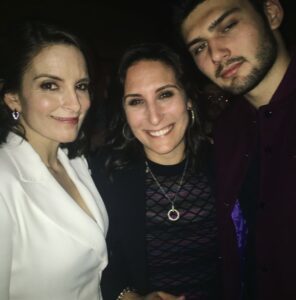
Tina Fey and Rosalind Wiseman at Mean Girls Musical opening night in 2018
While my team and I had worked hard in good faith for months on what I thought was an opportunity to help families, it was actually a tactic to distract me so I wouldn’t do anything to stop the musical. It was a wasted opportunity to bring people together and give critical resources to young people. Why pretend that these issues are important to you beyond making money off of people who can afford to go to a Broadway show?
Why am I coming forward now?To be clear, I have not been completely silent. I have reached out behind the scenes and asked Paramount and Tina Fey to work with me to find ways to lift all boats. I didn’t come publicly forward because I didn’t want my experience to be seen as a Mean Girls story and it was hard to believe that I was so misled. I was willing to keep trying because I wanted to work on these issues for young people and Mean Girls is an amazing platform.
I am incredibly inspired by young people who are calling out hypocrisy and abuse of power they see in their lives. So when I was given the opportunity to share my story with Aarti Shahani, a brilliant reporter for National Public Radio on The Art Of Power Podcast, I agreed to go on the record.
I want my principles to align with a life of dignity for myself. I want to share my experience to show just one more example of how the entertainment industry accepts and rewards exploitation and inequity. When there is systemic abuse of power it becomes easier to justify unethical behavior and normalize it.
This is what Cultures of Dignity and my life’s work is about, the difference between how we define respect and dignity. Dignity is recognizing people’s inherent right to be recognized for their humanity. Respect is showing admiration for someone because of their abilities, qualities, or achievements. Dignity is a given. Respect is earned. I don’t respect the actions of people who aren’t true to their word or exploit their power to marginalize others. I do need to treat those people with dignity. In the conversations we are having in our culture when a public figure acts shamefully, we tend to blame and attack. Dignity is what is missing from these conversations.
Acknowledging systemic abuse of power and how it takes away all of our dignity is what this is about.
Listen to the full episode of Rosalind Wiseman Breaks Her Silence On ‘Mean Girls’: “Art of Power” with Aarti Shahani
Listen to the Podcast Recent Posts Parenting Forward Podcast: Cultures of Dignity with Carey Goldstein The Truth Behind ‘Mean Girls’ Rosalind Wiseman Breaks Her Silence On ‘Mean Girls’: “Art of Power” with Aarti Shahani Episode Join our newsletter, Communiquette!
Email:* jQuery(document).bind('gform_post_render', function(event, formId, currentPage){if(formId == 7) {} } );jQuery(document).bind('gform_post_conditional_logic', function(event, formId, fields, isInit){} ); jQuery(document).ready(function(){jQuery(document).trigger('gform_post_render', [7, 1]) } );
The post The Truth Behind ‘Mean Girls’ appeared first on Cultures of Dignity.
April 15, 2021
Rosalind Wiseman Breaks Her Silence On ‘Mean Girls’: “Art of Power” with Aarti Shahani Episode
Mean Girls, the 2004 movie and later the 2018 Broadway musical, has made more than a quarter billion dollars in ticket sales. But the author of the original source material, Rosalind Wiseman, reveals for the first time on Art of Power that she did not reap the significant financial benefits attached to her creative work. In her contract with Paramount Pictures, Wiseman was promised 5% of net proceeds. Paramount claims the blockbuster film is in the red and has not paid her not a single penny in profits. Wiseman opens up about her disappointment with Paramount Pictures and screenwriter Tina Fey. Wiseman asked the celebrity comedian to use her power to help. Fey said she would, and then ghosted the fellow writer. This episode is about bad deals, Hollywood accounting, power and the people who use it.
Listen to the podcast episode:https://culturesofdignity.com/wp-content/uploads/2021/04/20210414205738-04-Rosalind-FINAL.mp3

Recent Posts Rosalind Wiseman Breaks Her Silence On ‘Mean Girls’: “Art of Power” with Aarti Shahani Episode Webinar – Self-Compassion: Choosing to Turn Towards Our Suffering with Kindness and Compassion with Megan Saxelby Self-Confidence Is Not Self-Esteem
The post Rosalind Wiseman Breaks Her Silence On ‘Mean Girls’: “Art of Power” with Aarti Shahani Episode appeared first on Cultures of Dignity.
April 13, 2021
Webinar – Self-Compassion: Choosing to Turn Towards Our Suffering with Kindness and Compassion with Megan Saxelby
Self-compassion is learning how to be kind to yourself so you feel more secure, have more bandwidth and develop resilience. Developing this skill is crucial to well-being, even more so during COVID. Emotions are like tunnels, you have to go through them and self-compassion is the fastest way to the other side.
In this self-compassion webinar we will…
Walk through a Tiny Guide on self-compassionLearn how to practice self-compassionGet tools and resources to better manage hard moments and challenging feelingsSlide Deck
Resources mentioned
Sigal Barsade PhD’s research on Emotional Contagion
Self-Compassion: The Proven Power of Being Kind to Yourself by Dr. Kristen Neff
RSA Short: Empathy by Brené Brown
@biglittlefeelings on Instagram: Emotional Intelligence for toddlers
Set Boundaries, Find Peace by Nedra Glover Tawwab
Emotional Agility by Susan David
Quick Emotional Processing Tool by Megan Saxelby
Dare to Lead Podcast episode: Brené with Dr. Susan David on The Dangers of Toxic Positivity
Tiny Guides on core social and emotional concepts
Recent Posts Webinar – Self-Compassion: Choosing to Turn Towards Our Suffering with Kindness and Compassion with Megan Saxelby Self-Confidence Is Not Self-Esteem Meet Our New Editorial Advisors!
Get the Cultures of Dignity Newsletter
Email:* jQuery(document).bind('gform_post_render', function(event, formId, currentPage){if(formId == 7) {} } );jQuery(document).bind('gform_post_conditional_logic', function(event, formId, fields, isInit){} ); jQuery(document).ready(function(){jQuery(document).trigger('gform_post_render', [7, 1]) } );
The post Webinar – Self-Compassion: Choosing to Turn Towards Our Suffering with Kindness and Compassion with Megan Saxelby appeared first on Cultures of Dignity.
April 6, 2021
Self-Confidence Is Not Self-Esteem
Self-Confidence Is Not Self-Esteem How to Help Kids Develop Their Core Assets and a Healthy Sense of Self So They ThriveBy Michele Borba, Ed.D.
Most parents view self-esteem as the flight path to happiness and success, so we constantly tell kids: “Believe in yourself,” “You’re special,” and “You can be anything you want.” We give trophies for showing up and gold stars for breathing (or just about). We smooth over every bump, solve any problem, and never, ever let them fail. But our well- intended efforts are reaping dismal returns. Today’s kids are more depressed than any previous generation, while their narcissism (“I’m better than you”) has increased more than their self-esteem.
Here’s what the research really shows: there is little evidence that boosting self-esteem increases academic success or even authentic happiness. Yup. All those participation trophies were for nothing. Several large reviews of school-based programs conclude that trying to boost self-esteem “had no discernible effect on students’ grades or achievement.” Studies do show, however, that children who attribute their grades to their own efforts and strengths are more successful than kids who think they have no control over academic outcomes. Once kids recognize what they do well, they’re motivated to use those strengths again and again. Each success boosts self-conviction a bit more, but the kid is always the doer and director of his own triumphs or failures.
Real self-confidence is an outcome of doing well, facing obstacles, creating solutions, and snapping back on your own. Fixing their problems, doing their tasks, or making things easier for them only makes kids think: “They don’t believe I can.” Kids who have self-assuredness know they can fail but also rebound, and that’s why we must unleash ourselves from hovering, snowplowing, and rescuing. Thrivers are always self-directed and they have a strong understanding of who they are.
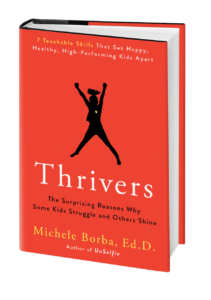 Building our children’s self-confidence starts looking inward at ourselves, and then turning our lens to our children. It helps us honor our children for who they are, not who we want them to be. Showing our respect for who they are is the greatest way to help kids respect themselves. It also unleashes competence, peak performance, and thriving abilities and reduces emptiness and burnout, but it starts by discovering who our magnificent kids are and then using those findings to help them develop accurate views of their assets and limitations.
Building our children’s self-confidence starts looking inward at ourselves, and then turning our lens to our children. It helps us honor our children for who they are, not who we want them to be. Showing our respect for who they are is the greatest way to help kids respect themselves. It also unleashes competence, peak performance, and thriving abilities and reduces emptiness and burnout, but it starts by discovering who our magnificent kids are and then using those findings to help them develop accurate views of their assets and limitations.
Identifying our children’s natural talents, strengths and gifts (or what I call “Core Assets”) can be one of our most important parenting tasks. These Core Assets can be personality features such as friendliness, being a good listener, or being a smart collaborator. They can be character traits like empathy, grit, and kindness. Or they can be talents and gifts like music, acting, and original thinking. Most important: Core Assets are those that you actually recognize in your child—not strengths you hope he possesses or those you see in yourself. They are her strongest positive qualities, character traits, and signature talents that can help her thrive. They are what make her who she is. Here are three ways to instill a sense of healthy confidence and stretch your child’s thriving potential.
1. Identify your child’s Core Assets.Over the next few days, tune into your child and identify her strengths, interests and natural gifts. TALENT describes six common characteristics of Core Assets when exhibited in an individual. Core Assets feature a child’s:
T = Tenacity. The child shows determination and perseverance to succeed at the task involving his asset.A = Attention. The child is easily absorbed in the task and focuses longer than when compared to other strength areas or Core Assets.L = Learning. The child learns quicker and easier when using the Core Asset.E = Eagerness. The child is motivated and energized to be an active participant in the task, and doesn’t need adult prod- ding or rewards.N = Need. The child is possessive about the Core Asset: “It’s my thing.” The asset is a confidence booster, relaxer, or fulfiller of a positive need.T = Tone. The child sounds excited, proud, or joyous when talking about the asset.
2. Acknowledge your child’s Core Assets.
Identify a few core strengths that you want your child to recognize about himself right now. Make sure they are legitimate and already present, and then acknowledge them frequently. Be specific so your child knows exactly what he did to deserve recognition. “You’ re patient: you always wait until it’s your turn and never get flustered.” “You’re tenacious: you hang in there and never give up!” “I noticed how you asked that older woman if she needed help.” Kids need to recognize their gifts before they want to put in any effort to improve.
3. Carve time.Many kids say there just isn’t enough time to spend on an interest they love if it isn’t considered “necessary” for school or sports success. We all want to help our children prioritize the skills we think will help them succeed in the world . . . but by redirecting their time we can inadvertently be quelling their true interests and passions. In fact, studies show that the average American kid gives up their talent because they don’t have enough time to practice their gift. Check your kid’s schedule: Is there one activity that can be cut that could free up thirty to sixty minutes a week for the strength? Can time playing video games, texting, or TV be reduced? Let’s help kids find time to cultivate their natural gifts while ensuring it’s the gift they love!
Self-confidence grows when kids know who they are and can apply their special gifts. Our role is to respect our kids for who they are, and then unleash their assets so they can develop to their fullest potential. If we are to succeed, we must let our kids lead us—and that is one more way we can raise a generation of strong, confident, internally-propelled kids who thrive!
Recent Posts Self-Confidence Is Not Self-Esteem Meet Our New Editorial Advisors! Let’s Get Beyond Asking “When Will the Insanity End”? Responding to the Boulder Shooting
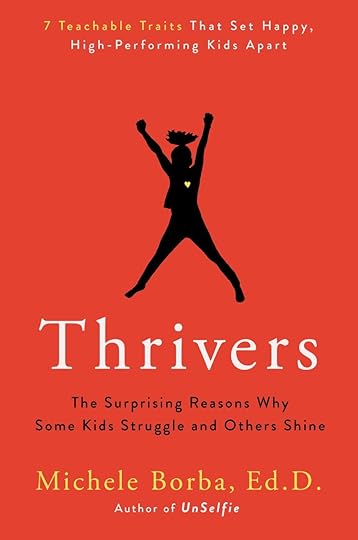
About the Author
Michele Borba, Ed.D., is an internationally renowned educational psychologist and an expert in parenting, bullying, and character development. A sought-after motivational speaker, she has spoken in nineteen countries on five continents, is a regular TODAY contributor and has been featured as an expert on Dateline, The View, Dr. Phil, NBC Nightly News, Dr. Oz, and The Early Show, among many others. Her latest book is titled, Thrivers: The Surprising Reasons Why Some Kids Struggle and Others Shine. For more information: www.micheleborba.com .
Michele Borba's Website
The post Self-Confidence Is Not Self-Esteem appeared first on Cultures of Dignity.
March 29, 2021
Meet Our New Editorial Advisors!
Our Cultures of Dignity Editorial Advisors review and provide feedback on all of our work. We heavily rely on young people’s experiences and insights to check our work – from lesson plans, to blogs, to presentations.
Young people are experts on what it means to live in this day and age but don’t always get to share their voice. At Cultures of Dignity, we get to listen to young people.
Get to know our newest editorial advisors below! The rest of the editorial advisor team can be viewed on our student voice page.
Recent Posts Meet Our New Editorial Advisors! Let’s Get Beyond Asking “When Will the Insanity End”? Responding to the Boulder Shooting Maintaining Boundaries In Times Of Change

Abigail is a 7th grader in Nashville who is obsessed with dogs and passionate about making sure everyone is seen as who they are no matter what culture, race, or religion!

Anne Ellis is a 10th grader in Washington DC. She has an unhealthy obsession with Kraft Mac & Cheese and spends most of her time at the barn. She is passionate about furthering discussions surrounding teenage mental health.

Archi is a freshman at Lincoln Community School in Accra, Ghana. Her favourite colour is purple and her favourite number is 7.

Audrey is a junior in Ghana, is obsessed with sports and baking and passionate about improving mental health among teenagers.

Ella is a 15 year-old student from Louisville, Kentucky, passionate about teenage mental health, who spends her free time reading, playing sports, and supporting the IU Hoosiers.

Helen is a senior in Washington DC. In her free time, she loves to go on local “adventures,” create art, or read Harry Potter. Her dream is to become what she describes as an “activist architect”; merging her love of math and art with her passion for creating affordable housing.

Joshua is a freshman in Ghana, a connoisseur of the tech variety, and determined to create a better, more open-minded society through the power of education.
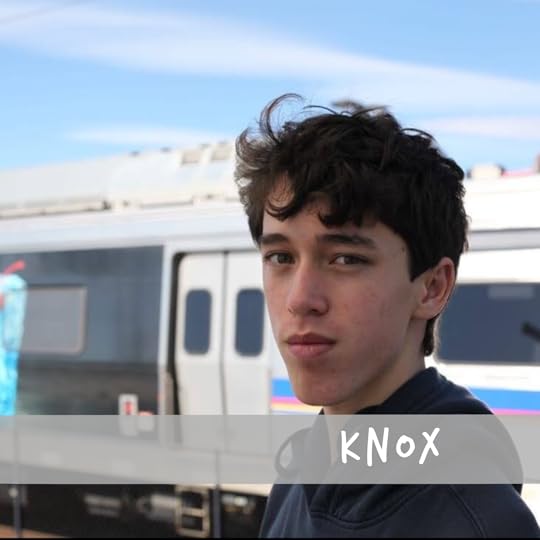
Knox is a sophomore from Colorado who enjoys nature and spending time with friends. He is interested in mental health and world affairs.

Lela is a freshman in Maryland. She loves seafood, and is passionate about advocating for the promotion of truth.

Lilly is a sophomore in Louisville, Kentucky, loves the summertime, and is passionate about getting everyone’s voice heard!

Liza is a freshman at BASIS Chandler in Arizona and is passionate about environmental conservation and mental health support for high schoolers. She’s also interested in ocean exploration and weird sea creatures.

Pacifica is a sophomore from Washington who loves baking and bad early-2000s animated movies, and is passionate about getting mental health and substance abuse support for teens.

Sahara is a freshman from Connecticut who loves thrifting and is passionate about women’s rights.

Simone is a Junior at Skyline High School in Longmont, CO. They love to sew and have a passion for social justice!

Subira is from Colorado and in the 7th grade. They love to write poetry and is passionate about ending toxic masculinity in schools.
Learn more about how we work with young people
STUDENT VOICE
The post Meet Our New Editorial Advisors! appeared first on Cultures of Dignity.
March 24, 2021
Let’s Get Beyond Asking “When Will the Insanity End”? Responding to the Boulder Shooting
On Monday our organization’s hometown became our country’s latest target of a mass shooting. Our state of Colorado has suffered the repeated trauma of mass shootings from Columbine to the Aurora Theatre to Monday’s Boulder shooting at our neighborhood grocery store.
It’s common after these mass shootings to ask “When will this insanity end?”
Let’s stop asking that question. Let’s also stop asking, “Wasn’t Las Vegas enough?” “Wasn’t Sandy Hook enough?” Because we should never ask that when one is too many. Instead let’s ask a question that moves us all towards action after the Boulder shooting. “How can dignity inspire us to do small yet powerful acts that make my community safer?”
We start small…How can I recognize the dignity of my neighbors?
What can I do to recognize dignity in myself?
Am I creating the necessary time and space to process and recover from emotional fatigue? These conversations take time and energy.
How do I support local mental health initiatives?
How can I advocate for background checks and bans on assault rifles?
How do I hold our elected officials responsible to make these reasonable changes in the law that the majority of the American public supports? This continuing violence is a collective violation of our dignity. By refusing to act on gun reform, our elected officials send the message that our humanity is not a priority.
We stop focusing on the individual reason why this particular shooter acted out.
We acknowledge the obvious patterns; that 96% of shooters are men and the majority of these perpetrators are white. To be clear, we don’t assume all men are capable of this kind of violence. But if we refuse to address this commonality, we miss an important data point that helps us proactively support people before they choose violence.
In moments like these, it’s also tempting to reach out to people who are somehow touched by the tragedy; whether because they are close geographically or share the victims’ race or ethnicity like the recent Atlanta shooting. But often we struggle with the right words.
We received a heartfelt message from a friend that graciously strikes the right tone that we wanted to share.
I just want to let you know that I’m thinking about you and to express that this horrible event has reminded me that we’re connected and I feel the need to share that with you as well. So do take care. You have my condolences and sympathy during this time. And unfortunately, that’s about all I have to offer. So sorry for you, your friends and neighbors and the whole Boulder community.
Boulder is our home. Some of us couldn’t leave our office on Monday until the “shelter in place” mandate lifted. We are safe from this shooting but we are hurting. We aren’t alone. We join many communities who have experienced this tragedy and, unfortunately, many more will join us unless we decide that we will unite in demanding our collective dignity. We know we can do it. Remember, we don’t need the grand gestures. The smallest acts will shift our world.
If you need emergency assistance, please contact Colorado Crisis Services: 1-844-493-8255, or Text “TALK” to 38255.
Recent Posts Let’s Get Beyond Asking “When Will the Insanity End”? Responding to the Boulder Shooting Maintaining Boundaries In Times Of Change Meet the 2021 Cultures Advisory Council
This originally appeared in our newsletter Communiquette.
Join our newsletter, Communiquette!
Email:* jQuery(document).bind('gform_post_render', function(event, formId, currentPage){if(formId == 7) {} } );jQuery(document).bind('gform_post_conditional_logic', function(event, formId, fields, isInit){} ); jQuery(document).ready(function(){jQuery(document).trigger('gform_post_render', [7, 1]) } );
The post Let’s Get Beyond Asking “When Will the Insanity End”? Responding to the Boulder Shooting appeared first on Cultures of Dignity.



